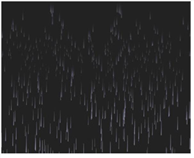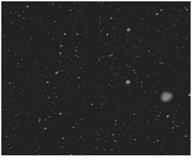

Nuke's Particle node set is a solution for creating particles in a 3D environment. You can create things like smoke, fog, falling snow, explosions, and bubbles - the possibilities are endless. You can use the various Particle nodes for emitting, manipulating, and displaying limitless types of particles in your 3D scene.
Here's a quick overview of the workflow:
| 1. | Create a ParticleEmitter node, and connect it to a Viewer. |
| 2. | Connect a source of emission and a particle representation to the emit and particle inputs of the ParticleEmitter. For more information, see Connecting Particle Nodes. |
| 3. | Modify your particles’ lifetime, velocity and other basic properties in the ParticleEmitter properties panel. For more information, Emitting Particles. |
| 4. | Connect other particle nodes to the ParticleEmitter’s output. See Adjusting the Speed and Direction of the Particles, Modifying the Particles’ Movement and Adjusting Particle Simulation Settings. |
| 5. | If necessary, cache your particle simulation in order to read it back in without the need for recalculation. For more information, see Caching Particles. |
|
|
|
| Rain created using particles. | Snow created using particles |
Spawning particles with ParticleSpawn
Adjusting the Speed and Direction of the Particles
Modifying the Particles’ Movement
Adjusting Controls Common to Several Particle Nodes
Adjusting Particle Properties Using Curves
Adjusting Particles Using Expressions
Adjusting Particle Simulation Settings